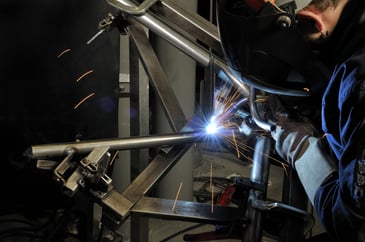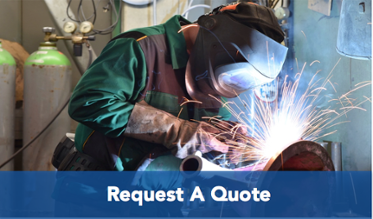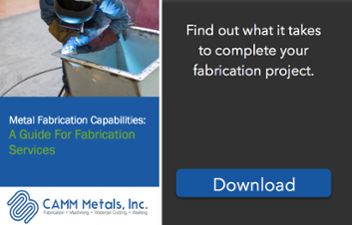 Tolerance is a crucial aspect of metal fabrication projects— and it remains one of the most examined factors for establishing manufacturing quality. Over the years, as tolerance expectations have increasingly more stringent, the more challenging the manufacturing process becomes for a given part. Even though technologies involved in water jet cutting, welding, and machining have continued to develop, especially tight tolerances are still not universally achievable by any given shop.
Tolerance is a crucial aspect of metal fabrication projects— and it remains one of the most examined factors for establishing manufacturing quality. Over the years, as tolerance expectations have increasingly more stringent, the more challenging the manufacturing process becomes for a given part. Even though technologies involved in water jet cutting, welding, and machining have continued to develop, especially tight tolerances are still not universally achievable by any given shop.
Tolerances are important to the manufacturing process as they determine how well a part will fit in final production and, as a result, how stable the final product will be. Essentially, tolerances can refer to mechanical fit, fit up, deviations from perfect straightness or accuracy of assembly. This post will provide a brief overview of how tolerance affects custom metal fabrication projects.
What are Tolerances, Exactly?
Tolerances are essentially limits on how much something can vary from its specification. They are important in ensuring the accuracy of a project as well as the ability for pieces to fit together. In metal fabrication, different tolerances are typically set for different parts of the process. These tolerances are typically small when dealing with very precise projects.
There are three main types of tolerances involved in metal fabrication, including essential, functional, and special.
- Essential tolerances limit the deviation for the mechanical resistance and stability of a structure
- Functional tolerances limit the deviation for fit-up and appearance. There are two classes of deviation. Class 1 is less strict and is the standard for routine fabrication, whereas class 2 is more expensive and requires special measures throughout the process.
- Special tolerances are for individual projects that might require tolerances not otherwise covered. Sometimes they are modifications of essential or functional tolerances and sometimes they cover aspects not addressed under these categories. Bridge structures often require these special tolerances.
How Does Tolerance Come Into Play With Custom Metal Fabrication Projects
Some precision metal fabrication products require a tight tolerance, which determines what process the fabricator will employ to manufacture the part. A wider tolerance opens up the opportunity to use a low-cost production method and to produce the parts at a faster rate. Customers usually require tighter tolerance where needed and use a wider tolerance on non-essential features. This approach helps to lower the overall manufacturing costs.
Projects Involving Multiple Processes Invite More Opportunity for Error
If you’ve read our recent Project Spotlight, which details how we fabricated a metal beer tank, you’ll likely understand that some metal fabrication projects require many processes before the final product is ready.
Considering the processes a specific part must go through in a manufacturing project, achieving perfect or near-perfect tolerances requires meticulous work. This is made more difficult by differences in materials, varied tolerance capabilities of different outsourced manufacturers, quality of assembly, and the number of hands or machines touching a part inherently establishes more room for error.
For this reason, it’s better to have one metal fabrication contractor working on your project. This way, if a project involves multiple processes to create the final product, you can rest assured that the processes will be consolidated in one facility. Working with one metal fabricator will always be helpful for producing tighter tolerances since the manufacturing process is evaluated and improved as a whole entity.
Better still if the metal fabricator has employees engineers who can properly design an entire process to meet the projects required tolerances.
How Risk Management Comes Into Play: The Importance of Precision
During every project, it’s important that the person in charge of risk management, check for correct tolerance. An experienced risk management team will not only be able to mitigate the risk associated with poor tolerances, but also dramatically reduce the number of faulty parts in a production cycle.
Risk management gives metal fabricators the opportunity to reflect their processes with objective data to determine how improvements can be made. By optimizing tolerances, risk management can run through parts faster. Basically, the tolerance requirements, the more time risk management must take to ensure quality.
Speak with a Fabricator to Determine Optimal Tolerances for Your Project
One of the more crucial factors of setting tolerances is to understand when tolerances are too tight. When tolerances are too tight, the do little but drive up the cost of production and add tedium to the manufacturing process. Remember, tolerances are useful for ensuring proper fit and functionality, however, if the same fit and functionality can be achieved with looser tolerances, the less intensive tolerances should be chosen even if tighter tolerances are possible.The added insurance of having tighter tolerances does not make up for the loss of productivity and increased cost a majority of the time.
In the end you will want to consult with your manufacturer to discuss their experiences with similar parts. Since the fabricator will have an in-depth knowledge of their own equipment and have likely seen a part with similar tolerances, they can make the most suitable recommendations for where to sacrifice on tighter tolerances.
CAMM Metals | Metal Fabricators in Connecticut
It's crucial to do your research when choosing a metal fabrication, as not all companies are capable of completing the same quality of work. CAMM Metals has years of experience, honing our skills across the board to deliver a quality product and measurable bottom line value to our customers.




